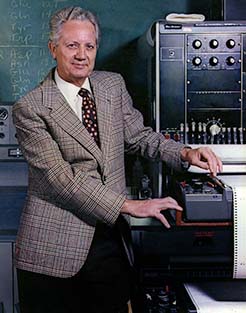Awards
- National Academies - 1976
- National Academy of Sciences
- National Academies - 1974
- American Academy of Arts and Sciences
- Distinguished Professor (Emeritus) - 1974
- Guggenheim Fellow - 1969

Frank W. Putnam was born August 3, 1917, in New Britain, Connecticut, and was raised in an orphanage when both of his parents died in 1920. He earned a B.A. with High Distinction in 1939, and an M.A. in 1940 in chemistry from Wesleyan University. Putnam then continued on to earn his Ph.D. in biochemistry from the University of Minnesota in 1942.
After finishing his Ph.D., and until the end of World War II, Dr. Putnam was a researcher for the office of Scientific Research and Development at Duke University. After the war, he spent a year defending the United States against biological warfare with the U.S. Chemical Corps in Maryland. In 1947, he moved to the University of Chicago, where he was an Assistant Professor in the Department of Biochemistry from 1947-1953, and Associate Professor in the Department of Biochemistry and at the Argonne Cancer Research Hospital from 1953-1955. He then moved to the University of Florida where he was appointed as the Head of the Biochemistry Department and a Professor therein. By 1965, Putnam was appointed Professor of Biology and Director of the brand new Division of Biological Sciences at Indiana University in Bloomington. He remained Director until 1969, implementing a necessary foundation for the evolution of a multi-departmental division structure within the Department of Biology during the 1970s. Putnam was then appointed Professor of Molecular Biology and Zoology in 1969, and Professor of Biochemistry in the I.U. School of Medicine, in 1971. He was then formally recognized as a Distinguished Professor of Molecular Biology and Biochemistry in 1974. Putnam retired from I.U. in 1988.
Dr. Putnam was a pioneer of research, and has published over 274 research papers and book chapters in the field of biochemistry. He spent much of his early research developing methods for the physical characterization of proteins, and was the first to recognize that the "Bence Jones protein" was the key to the mystery of the myeloma antibody structure. The theory that proteins produced by an immune system cancer were in fact closely related to normal antibodies was considered radical at the time, but the Putnam Research Group, at the University of Florida, was responsible for making many of the crucial determinations of the primary structure of antibodies.
Putnam served in numerous capacities; among them he was involved in numerous activities of the National Academy of Sciences, served as chairman of the Assembly of Life Sciences, and an advisory arm of the National Research Council. He also served on the Board of Directors of the Radiation Effects Research Foundation, Hiroshima, Japan, until 1987. After retirement, he continued to serve on several boards and committees, including the Board of Governors for the Argonne National Laboratory.
Putnam spent several periods as a visiting scientist in Cambridge, including in 1952, when he worked with Fred Sanger, who went on to earn two Nobel Prizes. In 1953, he was a Lasdon Research Fellow, and in 1970 he earned a Guggenheim Fellowship. In 1972, Churchill College, University of Cambridge named him an Overseas Fellow, and awarded him an honorary M.A. in 1973. In 1974, Putnam was elected to the American Academy of Arts & Sciences, and in 1976, he was elected to the National Academy of Sciences.
Frank W. Putnam died in 2006.